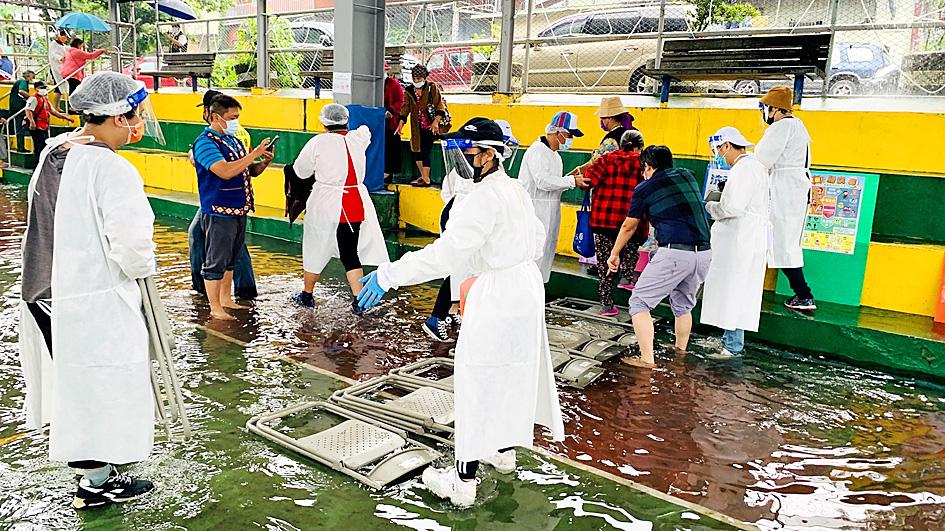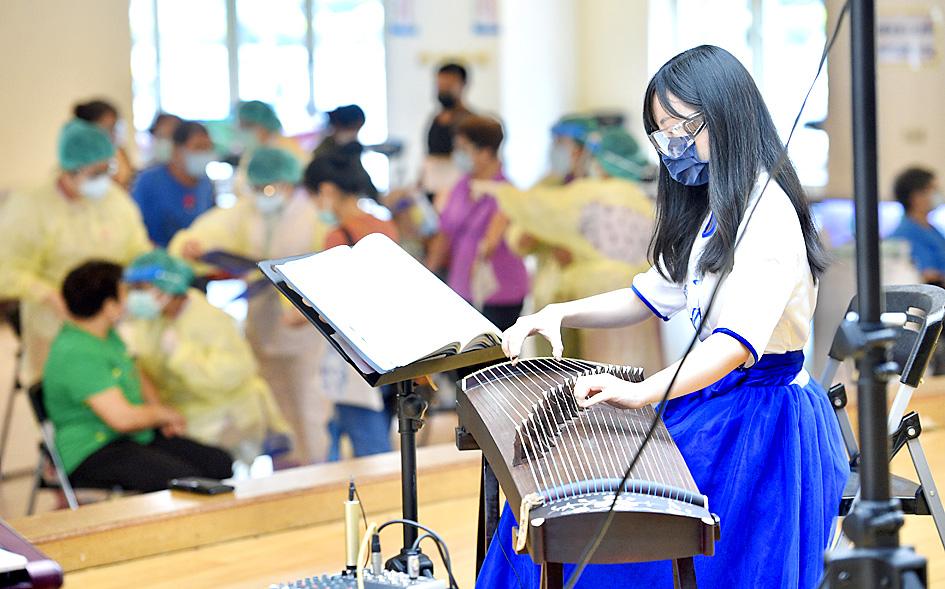The Central Epidemic Command Center (CECC) yesterday said that pregnant women would be added to the sixth priority group for COVID-19 vaccinations, and they would be eligible along with the seventh and eighth priority groups in the next round of vaccine distribution.
After the second shipment of the purchased Moderna COVID-19 vaccines, about 240,000 doses, arrived on Friday last week, another batch of 2.5 million doses, donated by the US government, arrived on Sunday.
The two batches are undergoing Food and Drug Administration testing.

Photo: Wang Jung-hsiang, Taipei Times
Minister of Health and Welfare Chen Shih-chung (陳時中), who heads the center, on Sunday said that the eligibility of vaccine recipients would be further expanded to speed up the vaccination program.
“Pregnant women and people aged 65 and older are certain to be included in the next round of vaccinations,” Chen said yesterday.
Chen said pregnant women would be included in the sixth priority group with people aged 75 and older, and that they would be allowed to choose which vaccine they wish to receive.

Photo: Peter Lo, Taipei Times
Pregnant women are advised to consult with their doctor, as well as assess the risks and benefits, before getting vaccinated, he said.
As of yesterday, the top six priority groups were eligible to receive the AstraZeneca vaccine, while only the top three priority groups were eligible for the Moderna vaccine.
Centers for Disease Control Deputy Director-General Chuang Jen-hsiang (莊人祥), who is CECC spokesman, said an Advisory Committee on Immunization Practices meeting was held on Sunday to revise the priority list.
The eighth to 10th priority groups were added to the list, with people aged 65 to 74 as the eighth group; adults aged 19 to 64 with underlying health conditions that have higher risk of severe illness from COVID-19 and people with rare or catastrophic illness as the ninth group; and adults aged 50 to 64 as the 10th group.
There are about 180,000 pregnant women, about 86,000 people in the seventh priority group of essential workers for maintaining national security and normal societal functions, and about 1.98 million people in the eighth priority group.
An estimated 5.7 million people are in the top eight priority groups, the list showed.
The new revised list would not be used for the batch of the AstraZeneca vaccines donated by Japan which are currently being administered nationwide, Chen said.
Asked if people could receive two different types of vaccine for their first and second doses, CECC specialist advisory panel convener Chang Shan-chwen (張上淳) said there have been foreign studies on getting a dose of the AstraZeneca vaccine and then a dose of the Pfizer-BioNTech vaccine, but there is less scientific research on the effects of receiving a dose of the AstraZeneca vaccine and then a dose of the Moderna vaccine.
The CECC therefore recommends that people receive two doses of the same vaccine, unless they suffered a serious allergic reaction after receiving a first dose of the AstraZeneca vaccine, Chang said.

Auckland rang in 2026 with a downtown fireworks display launched from New Zealand’s tallest structure, Sky Tower, making it the first major city to greet the new year at a celebration dampened by rain, while crowds in Taipei braved the elements to watch Taipei 101’s display. South Pacific countries are the first to bid farewell to 2025. Clocks struck midnight in Auckland, with a population of 1.7 million, 18 hours before the famous ball was to drop in New York’s Times Square. The five-minute display involved 3,500 fireworks launched from the 240m Sky Tower. Smaller community events were canceled across New Zealand’s

The Ministry of Foreign Affairs (MOFA) yesterday said it is closely monitoring developments in Venezuela, and would continue to cooperate with democratic allies and work together for regional and global security, stability, and prosperity. The remarks came after the US on Saturday launched a series of airstrikes in Venezuela and kidnapped Venezuelan President Nicolas Maduro, who was later flown to New York along with his wife. The pair face US charges related to drug trafficking and alleged cooperation with gangs designated as terrorist organizations. Maduro has denied the allegations. The ministry said that it is closely monitoring the political and economic situation

UNRELENTING: China attempted cyberattacks on Taiwan’s critical infrastructure 2.63 million times per day last year, up from 1.23 million in 2023, the NSB said China’s cyberarmy has long engaged in cyberattacks against Taiwan’s critical infrastructure, employing diverse and evolving tactics, the National Security Bureau (NSB) said yesterday, adding that cyberattacks on critical energy infrastructure last year increased 10-fold compared with the previous year. The NSB yesterday released a report titled Analysis on China’s Cyber Threats to Taiwan’s Critical Infrastructure in 2025, outlining the number of cyberattacks, major tactics and hacker groups. Taiwan’s national intelligence community identified a large number of cybersecurity incidents last year, the bureau said in a statement. China’s cyberarmy last year launched an average of 2.63 million intrusion attempts per day targeting Taiwan’s critical

‘SLICING METHOD’: In the event of a blockade, the China Coast Guard would intercept Taiwanese ships while its navy would seek to deter foreign intervention China’s military drills around Taiwan this week signaled potential strategies to cut the nation off from energy supplies and foreign military assistance, a US think tank report said. The Chinese People’s Liberation Army (PLA) conducted what it called “Justice Mission 2025” exercises from Monday to Tuesday in five maritime zones and airspace around Taiwan, calling them a warning to “Taiwanese independence” forces. In a report released on Wednesday, the Institute for the Study of War said the exercises effectively simulated blocking shipping routes to major port cities, including Kaohsiung, Keelung and Hualien. Taiwan would be highly vulnerable under such a blockade, because it